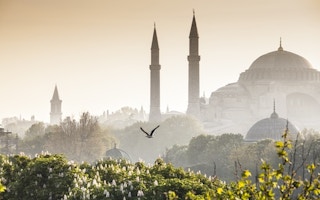An influential group of Islamic leaders has urged world governments to prevent human-caused climate change forcing global average temperatures more than 2°C above the pre-industrial level.
In a radical advance on the position of most developed countries, the group says it would be better to aim for 1.5°C ̶ the lower limit that many climate scientists say would offer a stronger chance of preventing climate change reaching dangerous levels, but to which few governments have so far agreed.
The group’s call, a long time in preparation, was issued at the end of the International Islamic Climate Change Symposium, held in the Turkish city of Istanbul, and is published as the Islamic Declaration on Global Climate Change.
It is addressed primarily to the negotiators who will meet in Paris in December at the UN Climate Change Conference, the main aim of which will be to get agreement on a robust and enforceable global treaty to cut emissions of greenhouse gases in time to stay within the 2°C safety limit.
“
Wealthy nations and oil-producing states are urged to “lead the way in phasing out their greenhouse gas emissions as early as possible, and no later than the middle of the century”.
Rapid phase-out
The authors also address people of all nations and their leaders, urging them to commit themselves to 100 per cent renewable energy and/or a zero emissions strategy as early as possible as part of a rapid phase-out of fossil fuels.
But they go much further than that. They write: “We particularly call on the well-off nations and oil-producing states to … stay within the 2°C limit, or, preferably, within the 1.5°C limit, bearing in mind that two-thirds of the earth’s proven fossil fuel reserves remain in the ground”.
This is a clear reference to the warnings that a large part of those reserves cannot safely be exploited, and will prove to be stranded assets.
There is growing pressure for corporate and individual investors to withdraw their support from fossil fuel exploiters, and the declaration’s signatories specifically recognise this.
They write: “We call upon corporations, finance, and the business sector to … assist in the divestment from the fossil fuel-driven economy and the scaling-up of renewable energy and other ecological alternatives.”
The declaration is blunt about what the signatories see as the urgent need for drastically far-reaching change. Wealthy nations and oil-producing states are urged to “lead the way in phasing out their greenhouse gas emissions as early as possible, and no later than the middle of the century”.
They are urged to provide generous financial and technical support to the less well-off to achieve that early phase-out of greenhouse gases, and should “recognise the moral obligation to reduce consumption so that the poor may benefit from what is left of the earth’s non-renewable resources …”
Carrying capacity
Elsewhere, the signatories say that “to chase after unlimited economic growth in a planet that is finite and already overloaded is not viable”. This is a rare reference to population and the planet’s “carrying capacity” ̶ the maximum population size that the environment can sustain indefinitely.
They even go so far as to call for “a fresh model of wellbeing, based on an alternative to the current financial model, which depletes resources, degrades the environment, and deepens inequality”.
These are demands for changes so radical that they are seldom heard. But they are addressed to the world’s 1.6 billion Muslims, to people of other faiths, and to “all groups” to join in “co-operation and friendly competition … as we can all be winners in this race”.
The declaration sets the bar high for the Islamic world, for people of all religions and of none, to treat climate change as a serious and present problem that demands fundamental change across global society.

















